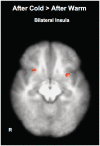Physical temperature effects on trust behavior: the role of insula
- PMID: 20802090
- PMCID: PMC3150863
- DOI: 10.1093/scan/nsq077
Physical temperature effects on trust behavior: the role of insula
Abstract
Trust lies at the heart of person perception and interpersonal decision making. In two studies, we investigated physical temperature as one factor that can influence human trust behavior, and the insula as a possible neural substrate. Participants briefly touched either a cold or warm pack, and then played an economic trust game. Those primed with cold invested less with an anonymous partner, revealing lesser interpersonal trust, as compared to those who touched a warm pack. In Study 2, we examined neural activity during trust-related processes after a temperature manipulation using functional magnetic resonance imaging. The left-anterior insular region activated more strongly than baseline only when the trust decision was preceded by touching a cold pack, and not a warm pack. In addition, greater activation within bilateral insula was identified during the decision phase followed by a cold manipulation, contrasted to warm. These results suggest that the insula may be a key shared neural substrate that mediates the influence of temperature on trust processes.
Figures





Similar articles
-
Experiencing physical warmth promotes interpersonal warmth.Science. 2008 Oct 24;322(5901):606-7. doi: 10.1126/science.1162548. Science. 2008. PMID: 18948544 Free PMC article.
-
Damage to the insula is associated with abnormal interpersonal trust.Neuropsychologia. 2015 May;71:165-72. doi: 10.1016/j.neuropsychologia.2015.04.003. Epub 2015 Apr 4. Neuropsychologia. 2015. PMID: 25846668 Free PMC article.
-
The neural basis of economic decision-making in the Ultimatum Game.Science. 2003 Jun 13;300(5626):1755-8. doi: 10.1126/science.1082976. Science. 2003. PMID: 12805551
-
Neural signatures of betrayal aversion: an fMRI study of trust.Proc Biol Sci. 2014 Mar 19;281(1782):20132127. doi: 10.1098/rspb.2013.2127. Print 2014 May 7. Proc Biol Sci. 2014. PMID: 24648217 Free PMC article.
-
The Trust Game in neuroscience: a short review.Soc Neurosci. 2013;8(5):407-16. doi: 10.1080/17470919.2013.832375. Epub 2013 Sep 2. Soc Neurosci. 2013. PMID: 23998424 Review.
Cited by
-
Somatic influences on subjective well-being and affective disorders: the convergence of thermosensory and central serotonergic systems.Front Psychol. 2015 Jan 13;5:1580. doi: 10.3389/fpsyg.2014.01580. eCollection 2014. Front Psychol. 2015. PMID: 25628593 Free PMC article. Review.
-
Helping Others, Warming Yourself: Altruistic Behaviors Increase Warmth Feelings of the Ambient Environment.Front Psychol. 2016 Sep 5;7:1349. doi: 10.3389/fpsyg.2016.01349. eCollection 2016. Front Psychol. 2016. PMID: 27656158 Free PMC article.
-
The Role of Temperature in Moral Decision-Making: Limited Reproducibility.Front Psychol. 2021 Sep 28;12:681527. doi: 10.3389/fpsyg.2021.681527. eCollection 2021. Front Psychol. 2021. PMID: 34650468 Free PMC article.
-
Neuropeptide Y Plays an Important Role in the Relationship Between Brain Glucose Metabolism and Brown Adipose Tissue Activity in Healthy Adults: A PET/CT Study.Front Endocrinol (Lausanne). 2021 Jul 9;12:694162. doi: 10.3389/fendo.2021.694162. eCollection 2021. Front Endocrinol (Lausanne). 2021. PMID: 34305816 Free PMC article. Clinical Trial.
-
The effects of temperature priming on cooperation in the iterated prisoner's dilemma.Evol Psychol. 2013 Jan 25;11(1):52-67. doi: 10.1177/147470491301100106. Evol Psychol. 2013. PMID: 23348419 Free PMC article. Clinical Trial.
References
-
- Barsalou LW. Perceptual symbol systems. Behavioral and Brain Sciences. 1999;22:577–660. - PubMed
-
- Bechara A. Disturbances of emotion regulation after focal brain lesions. International Review Of Neurobiology. 2004;62:159–93. - PubMed
-
- Bechara A. Decision making, impulse control and loss of willpower to resist drugs: a neurocognitive perspective. Natural Neuroscience. 2005;8:1458–63. - PubMed
-
- Berg J, Dickhaut J, McCabe K. Trust, reciprocity, and social history. Games and Economic Behavior. 1995;10:122–42.

